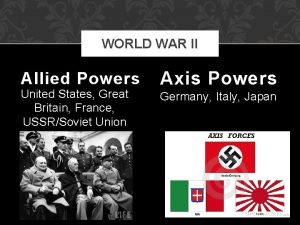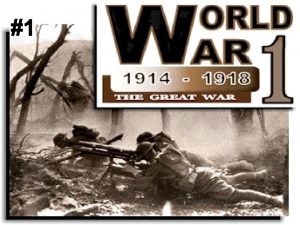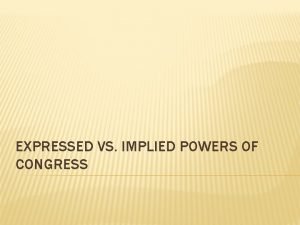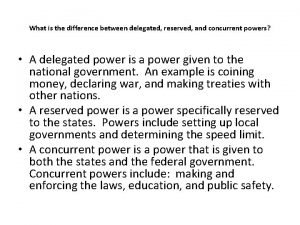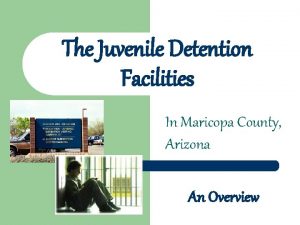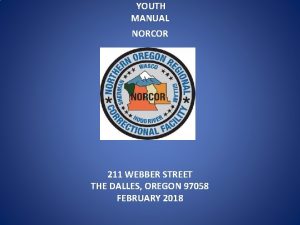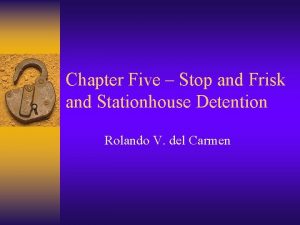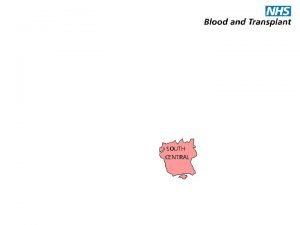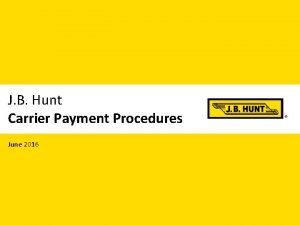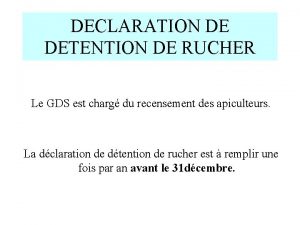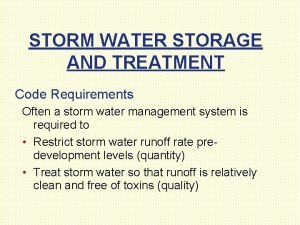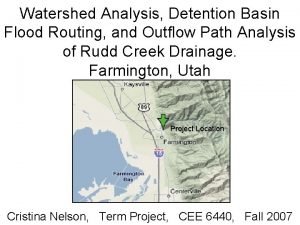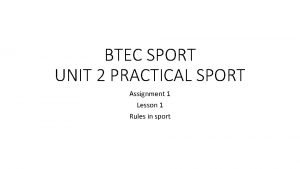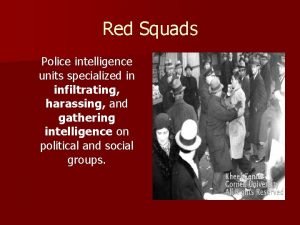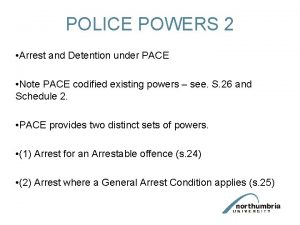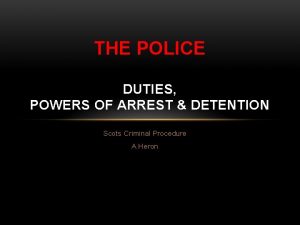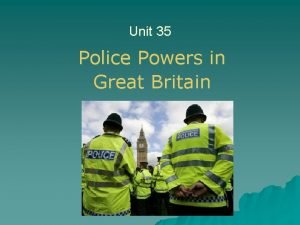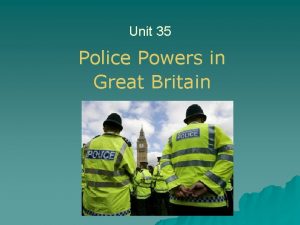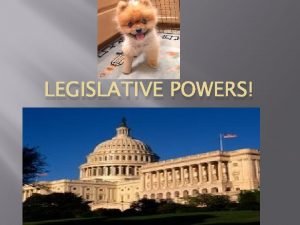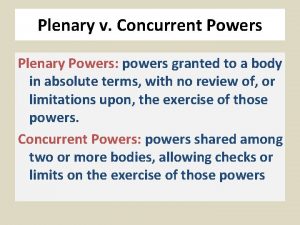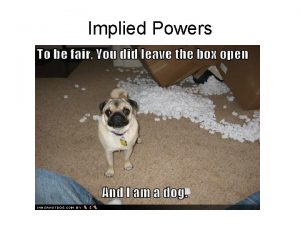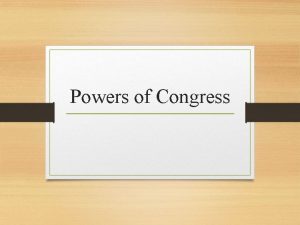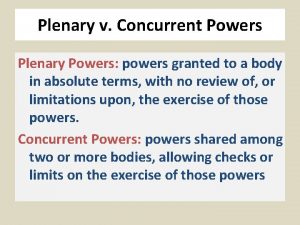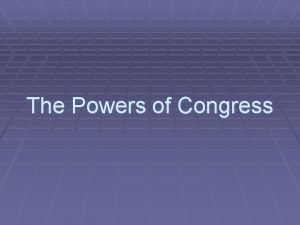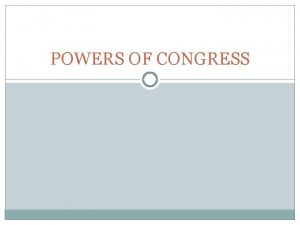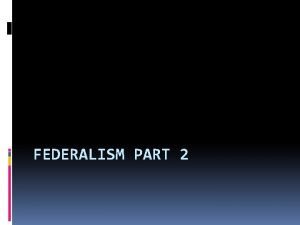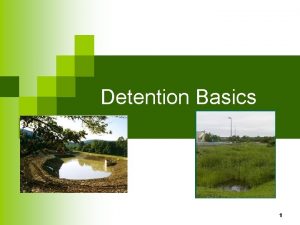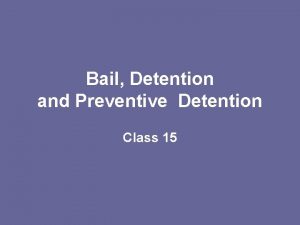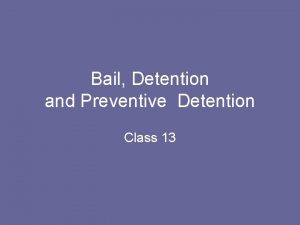UNIT 4 POLICE POWERS REGULATIONS FOR THE DETENTION






















- Slides: 22

UNIT 4: POLICE POWERS REGULATIONS FOR THE DETENTION OF SUSPECTED OFFENDERS: POWERS OF ARREST

LEARNING OUTCOMES: • You will be able to: • State which laws gives the police powers of arrest • List the conditions that have to be present for an arrest • Describe the difference between arrest with or without a warrant • Outline when a person can make a citizen’s arrest • Explain how the police should conduct an arrest • Identify Public Order offences

MEET PC 2312 JOHNSTON….

WHAT POWERS DO YOU THINK PC JOHNSTON HAS? • Arrest • Stop and Search a person • Entry, Search and Seizure • Seizure

WHAT IS AN ARREST? • An arrest is a restriction of the freedom of the person and the person can be detained • For an arrest to be valid: • a) there must be a POWER of arrest; and • b) the arrest must be carried out in the proper MANNER https: //www. youtube. com/watch? v=6 f. SVejb 1 CYI

WHILE PC JOHNSTON IS ON DUTY HE SEES… • Marcus breaks a window to gain access to a house. PC Johnston arrests Marcus on suspicion of burglary. It turns out that the house belongs to Marcus and he broke the window to get into he house because he had lost his key. • In groups decide if PC Johnston had valid grounds for arresting Marcus under Section 110 Serious Organised Crime and Police Act (SOCPA) 2005 which substituted S 24 Police and Criminal Evidence Act (PACE) • State which section of the Serious Organised Crime and Police Act applies

EXPLANATION • PC Johnston had valid grounds for arresting Marcus under S 110 (1) (d) if he reasonably suspected that March was committing burglary and one or more of the conditions in S 110 (5) was satisfied • This is an example of an arrest WITHOUT warrant

NECESSARY ARREST? • PC Johnston can exercise his power of arrest (under S 110 (1), (2), (3) SOCPA 2005) if he has reasonable grounds for believing that the arrest is necessary for one or more of the reasons set out in Section 110 (5) SOCPA 2005 • Make a list of those reasons under S 110 (5) • The police have a wide discretion as to what is meant by necessary

ARREST WITHOUT WARRANT • Under the case of R v Howell (1982) the police have a common ; law power of arrest to prevent breach of the peace. • Read the resource handout and answer the following question: • When can PC Johnston make an arrest for breach of the peace?

ARREST WITHOUT WARRANT • Explanation: • PC Johnston can make an arrest for breach of the peace where: • a) committed in his presence • b) when PC Johnston has reasonable cause to believe that a breach will be committed by a person in the near future: OR • c)when the breach of the peace has been committed and he has reasonable grounds to believe that the breach will occur again if the person is not arrested

INDICTABLE OFFENCES…. • Rrdmue • Murder • Htfet • Theft • Rubylagr • Burglary • Ssoesspino fo nabcnis • Possession of Cannabis • Mincalri gadaem • Criminal damage • oebrybr • Robbery

ARREST WITH WARRANT • David was due at the Bradford Magistrates Court on 3 rd January 2017 at 9. 30 am. He fails to attend Court and his solicitor has no explanation as to why he did not attend Court • The Court issue a warrant for his arrest. What does this mean?

CASE STUDY • There have been a number of robberies at Bowling Park. Anita knows that her friend Alice will be walking through the park in the evening. She decides to play a trick on Alice by hiding in some bushes and jumping out in front of her as she walks by. PC Johnston see Anita hiding in the bushes. Thinking that she may be about to commit a robbery, PC Johnston arrests Anita. • Does PC Johnston have valid grounds for her arrest under S 110 SOCPA 2005? Explain your answer

EXPLANATION • PC Johnston has valid grounds for making the arrest under Section 110 (1) (C) if he reasonably believed that Anita was about to commit a robbery as long a one or more of the conditions in Section 110 (5) were satisfied

CITIZENS’ ARREST (STILL AN ARREST WITHOUT WARRANT) • What do you think this means? • Section 110 SOCPA 2005 substituting 24 A PACE states: • Anybody can arrest a person who is committing an indictable offence (Section 24 A (1) in Section 110 SOCPA (2005)) • Anybody can arrest a person where an indictable offence has been committed (Section 24 A (2) in Section 110 SOCPA (2005)) • This is different to a police officer who can also arrest a person where they believe a person or persons are about to commit an offence

ARREST PROCEDURE • In pairs role-play making an arrest • In groups discuss what information is to be given to the suspect • What kind of force can PC Johnston use when making an arrest • What is the wording of the caution that the police must give the suspect?

ARREST POWERS • What do you think of these powers?

PUBLIC ORDER ACT OFFENCES • These types of offences are governed by the Public Order Act 1986 • They are intended to protect members of the public from intimidation and threatening behaviour by groups or individuals • Some of the offence can be conducted in private as well as public areas

PUBLIC ORDER ACT OFFENCES

PUBLIC ORDER ACT OFFENCES

PUBLIC ORDER ACT OFFENCES • Can include offences against hospital workers – A&E staff dealing with abusive person who is drunk. Why would this be an offence under this Act?

LEARNING OUTCOMES: • You will be able to: • State which laws gives the police powers of arrest • List the conditions that have to be present for an arrest • Describe the difference between arrest with or without a warrant • Outline when a person can make a citizen’s arrest • Explain how the police should conduct an arrest • Identify Public Order offences
 Was the united states on the axis powers or allied powers?
Was the united states on the axis powers or allied powers? Causes of nationalism
Causes of nationalism Expressed vs implied powers of congress
Expressed vs implied powers of congress Enumerated vs expressed powers
Enumerated vs expressed powers Implied powers
Implied powers Delegated powers vs reserved powers
Delegated powers vs reserved powers Congress informal powers
Congress informal powers Detention slips
Detention slips Durango juvenile detention facility
Durango juvenile detention facility Primary detention
Primary detention Norcor juvenile detention
Norcor juvenile detention Stationhouse detention
Stationhouse detention Trish collins detention
Trish collins detention Transflo velocity
Transflo velocity Seminole county juvenile detention center
Seminole county juvenile detention center Déclaration de détention de ruches
Déclaration de détention de ruches Retention vs detention pond
Retention vs detention pond Coefficient of detention
Coefficient of detention Btec sport level 3 unit 7 assignment 1
Btec sport level 3 unit 7 assignment 1 S j p u
S j p u Chicago police intelligence unit
Chicago police intelligence unit Unit 6 review questions
Unit 6 review questions Fspos vägledning för kontinuitetshantering
Fspos vägledning för kontinuitetshantering
